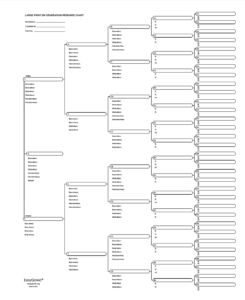 Genealogy or family history, as it is often known, is the study of a person or family groups ancestors. It is derived from a Greek word genea which means race or family, and logy which means the study of an area of interest, so genealogy means the study of race or family. Genealogy has been around in some form or another since man first walked the earth, first in the form of oral stories, then being written down, and then from about 1500 the birth of the more modern form of genealogy with the keeping of written records.[note]Encyclopaedia Britannica, 'Genealogy'. https://www.britannica.com/topic/genealogy. Accessed 14 September 2016.[/note]
Genealogy or family history, as it is often known, is the study of a person or family groups ancestors. It is derived from a Greek word genea which means race or family, and logy which means the study of an area of interest, so genealogy means the study of race or family. Genealogy has been around in some form or another since man first walked the earth, first in the form of oral stories, then being written down, and then from about 1500 the birth of the more modern form of genealogy with the keeping of written records.[note]Encyclopaedia Britannica, 'Genealogy'. https://www.britannica.com/topic/genealogy. Accessed 14 September 2016.[/note]
 You have come to this website because you are interested in your family history and want to learn how to start tracing your ancestors. This is where I want to help you because I know that you already know more than you think you do. The first rule of family history research is to start writing down what you know - names, dates, and locations.
You have come to this website because you are interested in your family history and want to learn how to start tracing your ancestors. This is where I want to help you because I know that you already know more than you think you do. The first rule of family history research is to start writing down what you know - names, dates, and locations.
Step 1 : Write down what you know
You need to start with yourself and work backwards noting names, dates, and locations of your immediate family. There are a number of different ways you can do this:- Use a Pedigree Chart - in this chart you start with your name and relevant dates, move onto your parents and grandparents with the knowledge you have.

- Build a tree using an online database, like Findmypast.
- Purchase family tree software to create your tree. There are many available Family Tree Maker (this is the one I use), RootsMagic, Legacy Family Tree to name a few.
Step 2: Talk with your relatives especially older ones
Quite often family stories are not recorded anywhere and valuable information is lost when an older relative dies.- oral recording or write down what they tell you

- look at photos to get more information
- look through documents, letters, diaries - it is amazing what secrets you can uncover!
Step 3: Look for spelling variations in names
Quite often you will be searching for a family member but are unable to find them anywhere and this could be because of a varied spelling of their name. There are many reasons why these variations occur:- many people only had basic literacy skills so would spell things how they heard them or phonetically e.g.
- local accents could lead to a different spelling of names e.g. Pritchard to Prichard
- trying to improve your social standing by making the name sound posher e.g. Smith to Smythe
- anglicising of names (especially common during WWI and WWII) e.g. Schmidt to Smith


I have always wanted to start looking into my family tree but my knowledge of dates and names of my older relatives is very little, is there a way of going back really far into my family history with just my parents names and date of birth?
Hi Matthew
There sure is! You start with what you know – you. Then you move onto your parents and gather their information – birth, marriage, death certificates – you will be surprised what information you can glean from these records. Once you have established definitively there information you move onto their parents. Obviously, the further you go back the harder it gets as government records don’t always exist, however, there are parish records. You could start building your tree today on Findmypast or Ancestry.com today. Just remember to start with yourself and you’ll be on your way to discovering your ancestry in no time.
Regards,
Megan